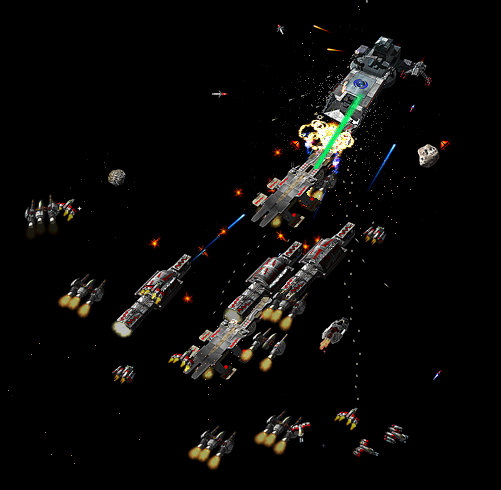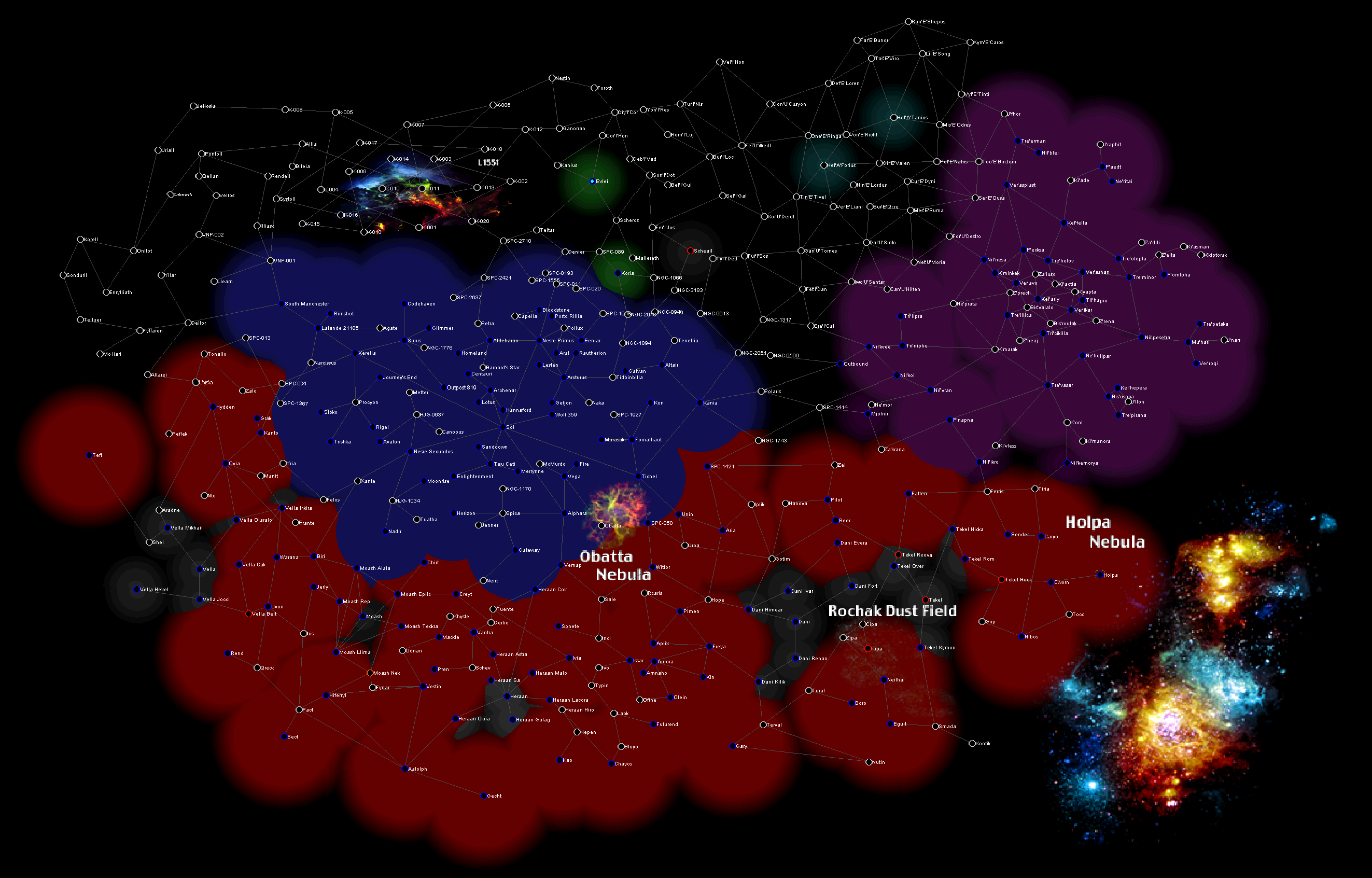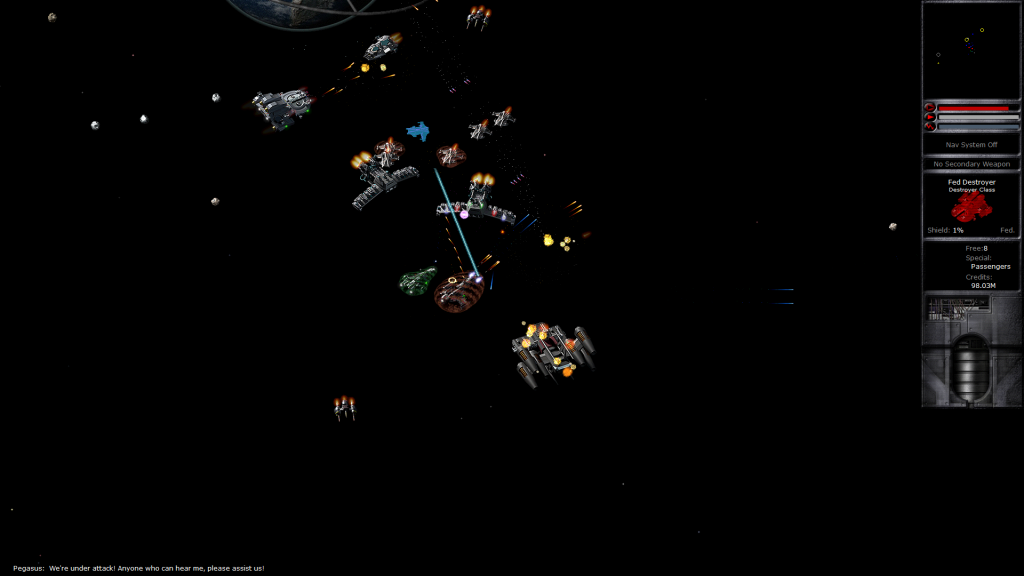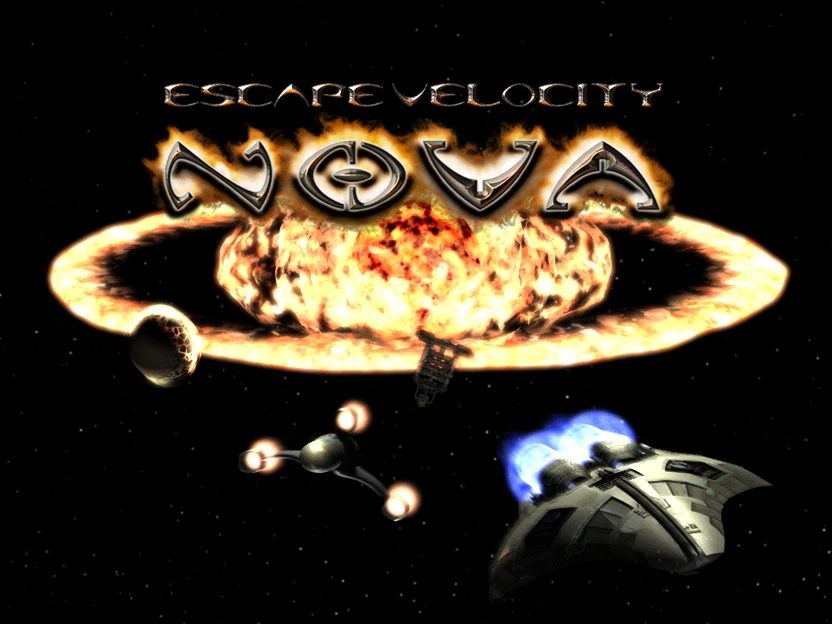Welcome back to GOONHAMMER ’02, where we look back at the games and media that we loved 20 years ago. Today Gunum is talking about Escape Velocity Nova, which was released in 2002 and could be seen as one of the earliest games where making political choices changed the landscape you played in.
It’s dark. My room is filled with the sounds of laser battles, imagination, and the steady sounds of digital capitalism. I should be finishing up my homework for my Social Studies class, but instead, I am engrossed in the battles happening on the much-to-bright screen of the candy apple red IMac that’s perched upon the dresser that’s alongside my new-to-me twin-sized bed. I was discovering something about myself, something that would shape me into a true gamer. I hadn’t ever felt so invested in a game as I had this one, a video game where I was building a galactic empire, system by system, and a name for myself as a mercenary and a truly powerful starship captain. The first game of my life that was eating up dozens of nights of my life, preventing me from truly developing friends and enjoying the joys of hockey games, was here in front of me, and I wasn’t going to stop till I hit my first million credits. That game was Escape Velocity: Nova.
In the Escape Velocity franchise, you started the game as the humble owner of a shuttlecraft who has a hunger for riches and glory. You’ll do this by slowly earning enough money to buy a new ship, most often a freighter with very little in the ways of defenses, and outfitting it with your desired capabilities. You’ll be control your destiny by trading, buying, selling, transporting people and goods, and going on special missions for a wide and seemingly endless cast of characters. You might choose to remain neutral in the interplanetary war between the Galactic government and their Rebels, or you could choose a side and join the fight. You might stay an ordinary day-trader and make a fortune, or you could become a mercenary and go on perilous missions. You may even become a pirate and make a living by pillaging other people’s ships. “People” is a loose term here, as the game was entirely populated by AI units. You’ll see these little guys moving on their own trade routes, having their own wars, and if you’re really lucky, maybe you’ll see them find some friends along the way.

In terms of genre, the Escape Velocity game line was in a class by itself, though you’ll see it reflected in things like EVE online or Starpoint Gemini 2. After you start playing and start upgrading ships, you’ll be as hooked as I was. The game is played from a bird’s eye perspective. As I said with EVE Online, you’ll note that this game has a similar feel to it. You’ll arrive on planets and spaceports, exploring the mission computer while drinking at the local tavern. You may communicate with other spaceships by hailing them and they’ll exchange pleasantries and pre-built tips and threats. You may engage in battles, hire escorts to help you move, board, and hunt for crippled ships, or gamble for additional money. Finally, since every ship needs to use gas to move from system to system you may find yourself floating in space endlessly. Like a down on their luck hitchhiker in the middle of the Candian wilderness, you’ll need to stick your digital thumbprint high in the sky and hope some other ship comes by and donates you a gallon of gas to get you to the next system.
Best of all, your decisions have consequences for the remainder of the game: effectively complete a task, and you will win favor with your employer, improving your chances of more thrilling and higher-paying missions. If you make a mistake or do anything that irritates the authorities, you may find yourself in hot trouble while attempting to return to certain planets. As you complete these kinds of missions, you would also begin to unlock access to their weapons, fighter-craft, and main ships. The universe itself encourages you to pick a side and reap the rewards from this conformity.

When players engage a ship in battle, after taking so much damage their prey will become “Disabled” soon before being destroyed. This looks like little health bars that get plinked away until the enemy ship seems to grey out showing its disabled status. Players can then choose to halt their attack to board the ship to take credits, resources, or even the entire ship (which can either replace or be added to the player’s fleet). Ship captures are, of course, not always successful as the crew onboard attempts to fight off anyone who dares step foot in their baby. This failure could cause the ship to explode next to you, maybe taking you out with them.
When you get farther into the game, you suddenly start encountering in-depth storylines and a multitude of alien races that become increasingly important. These adventures provide you with storylines that can lock you into different paths, for example joining with pirates or a rebel gang against the galaxy as I covered earlier. Sometimes, you are even able to join up with those very same alien races after taking some extreme actions, forsaken your own original faction. These actions can’t be taken lightly however, once you start one, you’re stuck with it for the rest of your character’s long and illustrious career. So you’ll end up like me, creating several characters throughout the game’s lifespan to get the most out of all there is in the game.
These storylines get more detailed and immerse you in the action. Of course, you must establish a reputation, but this is where you will find the best ship upgrades and ships, depending on the race you are with. They’re all one-of-a-kind, with a wide range of weaponry. As you play, you’ll realize that you won’t always be drawn into a tale. You could come across sub-tasks that are simply for fun, quick cash, or the key to unlocking a new series of missions that, if you’re lucky, will lead to new weaponry or ships.

Something amazing with this game was it was the first time I had seen mods used to an incredible level. This resulted in the production of a large number of original plug-ins by the fan community. Because the basic game on which all plug-ins are built is more sophisticated than previously, this increases the replay value even more than the original game, from a replica of the Star Wars universe to ships from Star Trek as well.
Refueling your spacecraft, going to the bar on a planet and gambling on space races, starting more stories, and striking up a bunch of sub-missions are all things you can do while visiting a planet. Wherever items are accessible, you may purchase and sell them. If you go into this, keep in mind the rates at various locations. Just like EVE online, we’re looking at some Buy-low, sell high capitalism plays. Some goods will sell at a very cheap price, while others will purchase at a very high price. Make a lot of runs to earn a lot of money! Then you’ll need a large transport ship to transfer large amounts of cargo at once for a large bank. You can also take part in missions. This is almost certainly where you’ll begin your adventures before you become a space emperor.
Finally, I would feel absolutely terrible not to mention that there is currently a Kickstarter that is actively trying to bring one of the greatest installments of this game back to life. This is being done over at Cosmic Frontier Override with a blessing from the game’s original creators. It’s a recreation of the same scenario designer’s Escape Velocity: Override, another jaw-dropping work of story-driven Sci-fi.
This game is a slam dunk. It’s one that I played for many years after its release in 2002, all the way into my college years. There’s just so much to do and so much havoc to be wreaked, politics to explore, and crazy adventures and stories to make. Even after you’ve completed everything conceivable, you’ll return a few months later simply to have a taste of that space combat opulence, and you’ll most likely become addicted to it again and again.
Have any questions or feedback? Drop us a note in the comments below or email us at contact@goonhammer.com.


